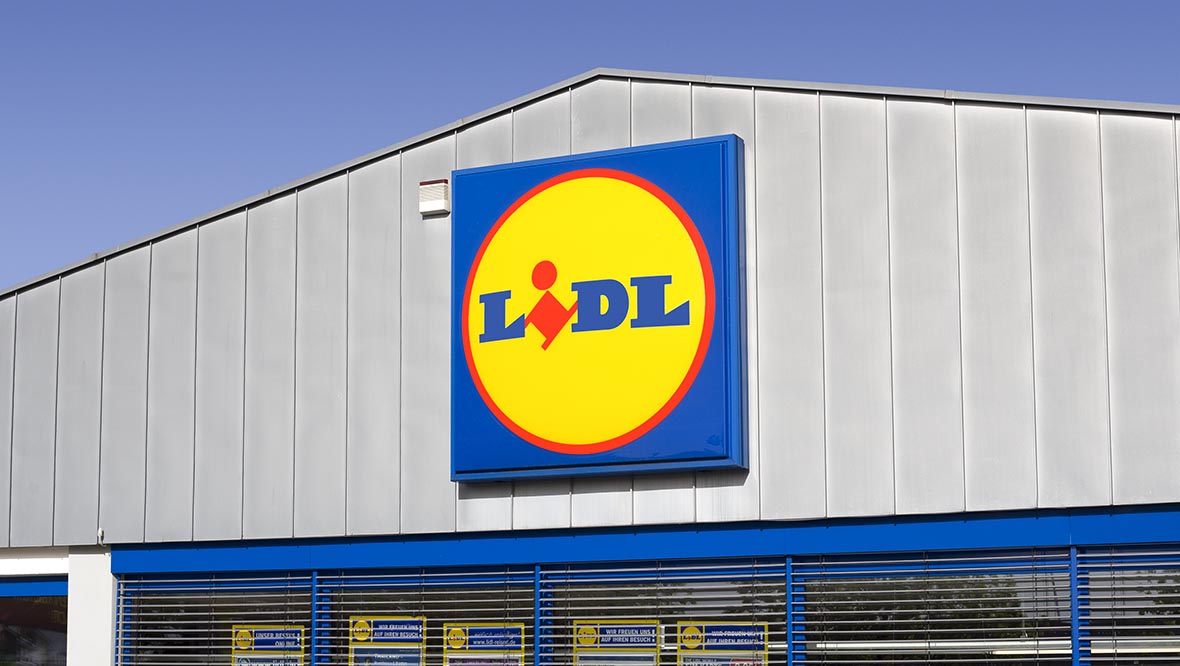Discount supermarket Lidl has been ordered by a senior judge to stop selling its own-brand gin as it allegedly breaches the trademark of an upmarket rival.
Lord Clark awarded an interim interdict on Tuesday to William Grant and Sons Irish Brands Limited, the makers of Hendrick’s gin.
The firm instructed lawyers to go to the Court of Session in Edinburgh as it believed the retail giant’s ‘Hampstead gin’ brand resembled their own product.
William Grant and Sons launched the legal action after the supermarket redesigned the Hampstead gin bottle to resemble the ‘apothecary-style bottle’ used by Hendrick’s.
Wiliam Grant’s legal team argued that the redesign also changed the colour of the diamond-shaped label from white to a similar pale colour used on the bottle in the Hendrick’s trademark.
They argued that the look of the label was changed to look like the Hendrick’s label and the bottle was in a darker colour of bottle – just like Hendrick’s.
In addition, they say Lidl changed the look of the label to include certain similarities to the Hendrick’s label. The re-designed version was in a darker colour of bottle, replicating the dark brown/black colour used by Hendrick’s.
The lawyers also said the redesign contained images of cucumbers – and this ‘alluded’ to the fact that Hendrick’s was unique in being served to drinkers with cucumbers.
They also pointed to comments made on social media in which people remarked on the similarities between the two products.
William Grant’s lawyers asked for a temporary order that would force Lidl to stop selling the redesigned Hampstead gin.
The court heard how the firm wanted the order to be granted because it feared that sales of Hendrick’s gin could be harmed from the sale.
Lord Clark agreed and said that the drinks firm’s legal team showed that its clients had a case that Lidl breached section 10 (3) Trade Marks Act 1994.
In a written judgement issued on Tuesday, Lord Clark wrote: “I accept that the pursuer in the present case has not (as yet) provided a sufficient basis to show a reasonable prospect of success in establishing a change in the economic behaviour of the average consumer or a serious likelihood that such a change will occur in the future. I do however recognise that there is at least some risk to the pursuer of harm to the brand.
“I take that factor into account and find that there is a reasonable prospect of success for the pursuer in showing that the defenders intended to benefit from the reputation and goodwill of the pursuer’s mark.
“Whether or not there was a deliberate intention to deceive, there is a sufficient basis for showing that there was an intention to benefit. It is difficult to view the re-design, including the change in colour of the bottle, as accidental or coincidental.
“I, therefore, conclude that there is a reasonable prospect of success on the part of the pursuer in showing a change in economic behaviour or a real likelihood of such a change by customers who buy from Lidl.”
The action brought by William Grant follows an action brought last month to the English high court by Marks & Spencer against Aldi.
M&S claim that Aldi was breaching its intellectual property rights by selling its Cuthbert cake. The firm claims the supermarket was breaching its Colin the Caterpillar trademark.
Earlier this year, William Grant instructed Scotland’s most senior advocate – the Dean of Faculty, Roddy Dunlop QC, to go to the Court of Session. Lidl instructed Lord Keen of Elie, who once acted as the UK Government’s Scots law advisor in the post of Advocate General.
Mr Dunlop told Lord Clark that the redesign of Hampstead gin, which retails for £15.99, attracted comments on social media. The court heard these comments included one that read: “Hmmm…Reminds me of another gin, but I just can’t put my finger on it…” – which was followed by laughing emojis.
In his judgement, Lord Clark said that a bottle of Hendrick’s gin and a bottle of the new Hampstead gin were lodged as “productions” in the case and that he had “these before me for consideration.”
Lord Clark also wrote that Lidl could sell the Hampstead gin brand but in a form that differs from its current design.
He wrote: “The defenders also have another get-up to sell the product, which is not challenged, so it is just the sales of Hampstead in this particular get-up that are stopped.”
Lord Clark also wrote that the current action could take years to deal with.
He added: “The pursuer’s product has been on the market in this form for quite some time and has an established reputation.
“If interim interdict is refused, but the pursuer succeeds at proof, then while there is no evidence yet of a change in economic behaviour of the average customer, there is still at least a risk (and I accept it is just a risk) of damage to the brand in the interim period. That period could, in light of any appeals, last for perhaps a couple of years.
“Quantification of any loss of sales of Hendrick’s gin, should that become an issue, will also be problematic, given that the product is sold in a wide range of retail outlets.
“Any award of damages if the pursuer succeeds is therefore likely to be difficult to quantify. On the other hand, if the defenders succeed at proof, in the interim any damage to the defenders is limited to loss of sales and some, albeit relatively contained, associated inconvenience.”
Follow STV News on WhatsApp
Scan the QR code on your mobile device for all the latest news from around the country


 iStock
iStock

























